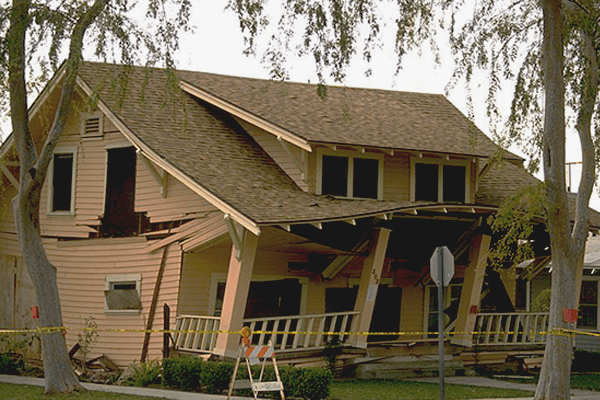Most Canadian residents do not have earthquake insurance as it is not on the top list of disasters that can happen in Canada. However, certain provinces have a higher probability of experiencing damaging earthquakes, such as the coast of British Columbia. Certain cities and towns along the Saint Lawrence river, like Quebec City and Montreal, also fall in the earthquake zone.
In this article, we will discuss whether earthquake damage is included in your home insurance policy and whether you need any additional earthquake home insurance.
For more information on earthquake insurance or home insurance in general, you can visit this site.

Contents
What is earthquake insurance and does home insurance cover earthquake damage?
Unfortunately, standard home insurance policies in Canada do not cover earthquake damage. However, you can always purchase earthquake insurance as an additional add-on coverage to protect your property from losses if your area experiences a severe earthquake. For example, if your gas outlet is damaged in an earthquake, your house might catch fire. In such a case, earthquake insurance will protect your dwelling.
Additionally, you may even apply for living expenses if your home is severely damaged in an earthquake.
What is the probability of an earthquake in Canada?
As per the Natural Resources Canada:
- Low-risk areas in Canada have a probability of less than 1% earthquake damage in the coming 50 years
- Moderate risk areas have a probability of 5% to 15% of earthquake damage
- High-risk areas in Canada have a chance of 30% of experiencing significant earthquake damage
What are the benefits of having earthquake insurance?
If earthquake insurance is part of your home insurance policy, you will receive significant coverage if an earthquake damages your house or property. Some of the benefits include:
- If you have earthquake insurance coverage, you will be able to live peacefully even if you are in an earthquake-prone region.
- The premium charges for an earthquake insurance policy are much less than the actual cost of rebuilding your house after an earthquake.
- If you live in a low-risk area, you can get this coverage for an even lower premium by increasing the deductible. Since the risk of earthquakes is low, the chances of deductibles being paid are also relatively low.
What is covered by an earthquake insurance policy in Canada?
Your home insurance earthquake coverage can pay for the following:
- Personal valuables: Cover any damage to personal belongings and valuables inside your house during an earthquake.
- ALE or Loss of Use: A good insurance policy will also pay for additional living expenses or loss of use. Simply speaking, your earthquake insurance policy will pay for all the expenses if you have to live in a nearby motel or hotel if an earthquake completely demolishes your house.
- Damage to property: This will cover any structural damage to your residence, dwelling, or commercial structure.
- Aftermath damage: Any repeated shockwave damage to your property within a specified period, which is usually 168 hours.
However, the deductible for most earthquake insurance policies is comparatively higher than for a standard insurance policy.
What does your earthquake insurance not cover?
The number of exclusions may vary depending on your Insurance company. Generally speaking, your earthquake insurance will not cover the following:
- Damage to safety equipment: Any damage to the sprinkler system or other safety devices.
- Loss of rent: If you had rented out your property, earthquake insurance will not pay any compensation for the loss of rent if the tenant moves out of your property.
- Professional charges: The fee charged by civil engineers and architects will not be included in the coverage.
- Removal of debris: The insurance policy will not cover the charges for removing any damaged item or debris inside or outside your property.
- Earthquake-related floods: If a flood occurs after an earthquake and causes structural damage to your property, your earthquake insurance will not offer any compensation. In that case, you must have valid flood insurance.
- Your earthquake insurance policy will also not pay for stabilization and seismic upgrading.
Insurance companies consider numerous factors to calculate your earthquake insurance premium. Some common ones include the probability of an earthquake in your area, coverage limits of your province, deductibles, the number of floors, and the construction quality of your home.
If you own a property in a high-risk area, you will pay higher insurance premiums and more deductibles. You might even be denied earthquake coverage if you live in an old property in a high-risk area.
Steps to follow to raise an earthquake insurance claim
Simply follow these steps to file for a claim in case your property is damaged by an earthquake:
1. Inform your insurance company immediately
Once an earthquake damages your property, you need to inform your Insurance company to raise a claim immediately. Additionally, you also need to have a copy of your Insurance policy.
Then, you can raise the claim by directly contacting them on their emergency number or sending them an email from your registered email address.
2. Collect pictures of the damage
If your house has suffered partial loss or damage, you must keep a record of everything. The best way is to click photographs of all the places that have experienced damage. This will act as evidence for the claim you are going to make.
3. Inspection
Once your insurance company learns about the event, they will send an inspector who will verify the actual damage and cross-check the evidence.
4. Compensation
Once the inspector is satisfied and all your documents have been verified, your claim will be approved, and the insurance company will send out the payment as soon as possible.
Earthquake home insurance coverage in Canada — Endnote
Whether you require earthquake home insurance or not depends on your preference and the area you live. If you live in a high-risk zone, you must own earthquake insurance as an add-on to your home insurance policy. Earthquake insurance is a smart investment despite the deductible amount and the annual premium charges, which are much less as compared to some other home insurance policies.
